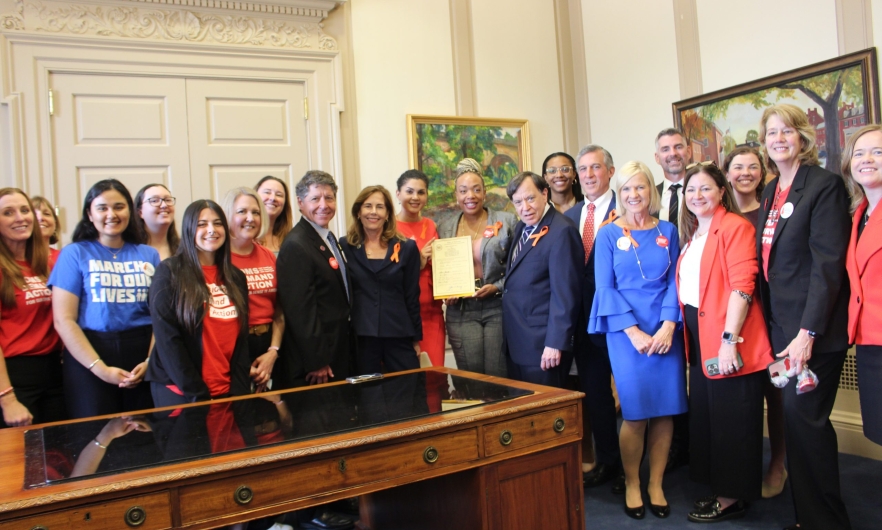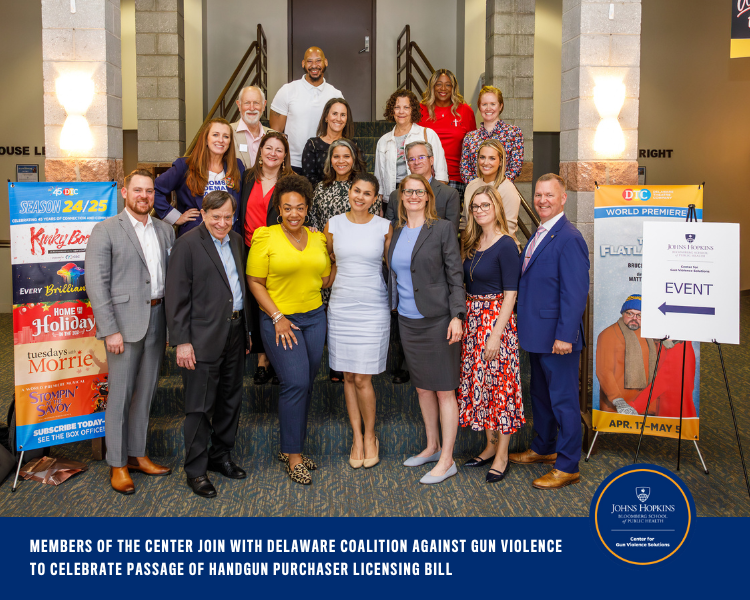Delaware's New Handgun Purchaser Licensing Law: Advocacy Makes a Difference
Delaware Governor John Carney has signed the state’s Handgun Purchaser Licensing bill into law.

Image Courtesy of Delaware Governor John Carney's Office
Following years of consistent engagement by dedicated advocates and legislators, a purchaser licensing bill, sometimes referred to as permit-to-purchase, passed the final hurdle in Delaware and has been signed into law by Governor John Carney. When enacted, the law will require all who seek to purchase a handgun, unless they have a valid Delaware concealed carry permit, to submit fingerprints, undergo a more thorough criminal background check, and complete live firearm safety training.
Research shows that if Delaware had adopted a Handgun Purchaser Licensing law when Connecticut did in 1995, we would expect there to have been 47 fewer firearm homicides and 103 fewer firearm suicides over the first 10 years of implementation1. This legislation is an important piece of Delaware’s multi-pronged approach to gun violence prevention.
“Delaware’s new law stands as a model for states around the country to pass policies that will save lives,” says Jen Pauliukonis, MPH ‘22, Director of Policy and Programming of the Center for Gun Violence Solutions at the Johns Hopkins Bloomberg School of Public Health. “Firearm Purchaser Licensing is backed by research and takes a public health approach to combatting the epidemic of gun violence.”
Eleven states and Washington, D.C. now have a Firearm Purchaser Licensing law in effect.
Research shows that licensing can also have positive impacts across state lines reducing the likelihood of illegal transfers and firearms trafficking. New permitting requirements increase accountability among both buyers and sellers and ensure all purchasers have undergone finger-printing and an in-depth background check.
“Implementing permit-to-purchase will reduce the flow of firearms to dangerous individuals, which will reduce gun violence not only in Delaware but throughout the region,” says Coalition for a Safer Delaware Executive Director Traci Murphy.

Delaware Attorney General Kathy Jennings testified in support of the bill. Jennings asserted her belief that the legislation included only reasonable requirements and regulations to enable people to carry guns safely. In a press release following the bill’s passage, she re-iterated comments made during the debate on the Senate floor saying, “Despite the gun lobby’s rhetoric, this is a fundamentally moderate, and clearly constitutional proposal.”
Public opinion polling shows that firearm purchaser licensing legislation is overwhelmingly supported by both gun owners and non-gun owners alike. Our Center's national survey found 77% support handgun purchaser licensing laws, including 63% of gun owners. Independent polling conducted among Delaware voters found that more than two-thirds of Delaware voters support handgun purchaser licensing laws.
Right now, state lawmakers are gathering in capitol buildings across the country to debate and consider thousands of pieces of legislation. They have the power and responsibility to consider life-saving solutions. Advocacy organizations in our Safer States Initiative network, like the Coalition for a Safer Delaware, are there too, ensuring decision-makers have the data and community input needed to enact meaningful policy change. Passage of this law would not have been possible without countless advocates who were there at every step of the process.
If you want to make a difference, find a Safer States Initiative group to get involved within your community:
References
1. i Augmented synthetic control methods were used for estimating the causal effects of Connecticut’s 1995 Handgun Purchaser Licensing law on firearm homicide and firearm suicide rates for the first ten full years following the law was in effect (1996-2005), when the law only applied to handguns, for the overall population and within specific demographic strata that have different levels of baseline rates of firearm mortality. Researchers applied strataspecific estimates of the effects of Connecticut’s law in terms of percentage change from the estimated counterfactual to the rates within demographic subgroups that Delaware experienced from 1996-2005 to account for differences in demographic composition between the two states. Delaware and Connecticut vary concerning race and age structure. Estimates range from 138 to 150 fewer handgun-related deaths for these demographic subgroups, respectively.




